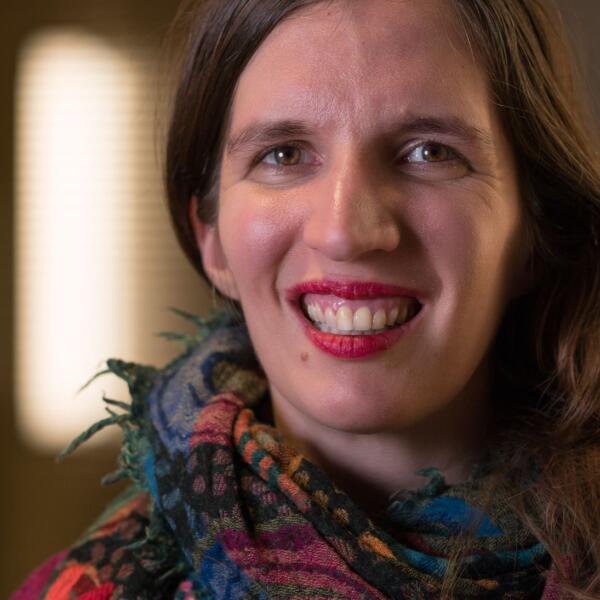
1. How did you start translating Romina Freschi’s poetry? What drew you to it?
I began translating excerpts from Romina Freschi’s first book, redondel (little round thing), on the invitation of an editor who was curating an anthology of contemporary Argentine women poetry. I immediately seized the opportunity. I had met Freschi in Buenos Aires four years earlier while doing research for my doctoral dissertation, and I was struck by her warmth, her generosity of spirit, and her incisive knowledge of the contempory Argentine literary landscape.
Soon after that, I was contacted by Michelle Gil-Montero, co-founder of Eulalia Books, and invited to translate the first book that they had chosen to launch their press in 2019: Freschi’s Eco del parque. And so, I have now translated Freschi’s first book as well as her most recent. Published over twenty years apart, the two books are so different in tone and theme that it is hard to believe they were written by the same poet…but they share a playfulness and deep respect for the intricacies of language.
2. What are some of the main challenges you’ve encountered translating Freschi’s work?
Freschi is considered part of the Latin American Neobaroque, and her writing is very complex. I eventually lost count of how many drafts I did of Eco del parque, and I could not have done it without Michelle Gil-Montero’s dedicated editorial input at every step. For that book, the challenge was engaging with the abstract language used to describe the philosophical ideas in the poem, largely having to do with human impermanence and the precarious relationship between human beings and non-human nature. redondel is a completely different work. I have translated several books by Uruguayan poet Marosa di Giorgio (with more in process!) and in some ways Freschi’s first book seems like an urban, hyperreal response to di Giorgio’s oneiric pastoral prose poems. Freschi says that the book was written in her early twenties and based on the youth culture she was part of in 1990’s Buenos Aires (with some of the characters based on her own friends). I see the book as a satire of many forms of media: television, movies, popular music, videogames, and to a lesser extent computers. For me the challenge with this book is the sheer outrageousness of it. I’ve never translated anything quite this goofy, and I’m never sure if I’m adequately translating the spirit of the book into twenty-first-century US English. But I’ve really been reveling in the process. Even though the book was written just as the Internet was becoming ubiquitous – long before the age of social media – I believe it has interesting things to say to the media-saturated culture we inhabit today.
3. What are you reading right now?
I recently visited New Mexico and passed by D.H. Lawrence’s house, so I decided to read Lady Chatterley’s Lover to find out what all the hoopla was about when it was first published. As I expected, the sex scenes left much to be desired, but Lawrence’s social commentary on the dehumanizing effects of industrial capitalism are very powerful (perhaps that is the real reason why the book was banned?) I also recently binge-read Elena Ferrante’s entire Neapolitan Quartet, and I recommend it to everyone!
Meanwhile, over the past months I’ve been involved with a book group focused on indigenous voices from North America, for which I read Heartbeat of Wounded Knee by David Treuer – a comprehensive and engaging history of indigenous people on our continent from 1890 to the present. And of course, I am reading Valerie Mejer Caso’s Edinburgh Notebook and Jorgenrique Adoum’s prepoems in postspanish, both published by Action Books!
An excerpt from redondel (little round thing) by Romina Freschi and translated by Jeannine Marie Pitas

Jeannine Marie Pitas’s most recent translations are Marosa di Giorgio’s Carnation and Tenebrae Candle (Cardboard House Press 2020) and Selva Casal’s We Do Not Live In Vain (Veliz Books 2020). Echo of the Park by Romina Freschi was published by Eulalia Books in 2019. She is a translation co-editor for Presence: A Journal of Catholic Poetry and an editor at the Song Bridge Project, a translation press based in Iowa City. She lives in Iowa, teaches at the University of Dubuque, and serves as a volunteer Spanish-English interpreter for Spanish-speaking newcomers to her local community.
Poesía en acción is an Action Books blog feature for Latin American and Spanish poetry in translation and the translator micro-interview series. It was created by Katherine M. Hedeen and is currently curated and edited by Olivia Lott with web editing by Paul Cunningham.